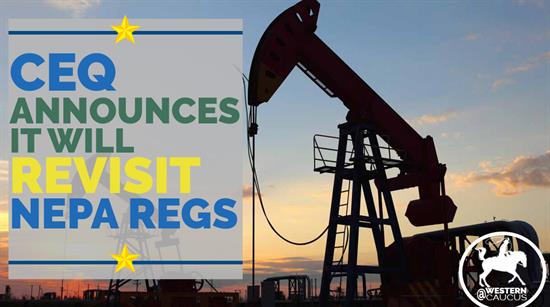White House Takes Up NEPA Implementation RulesCaucus: 'Revisions should remove bureaucratic hurdles'
Washington,
June 20, 2018
WASHINGTON, D.C. – Today, Members of the Congressional Western Caucus including Chairman Paul Gosar (AZ-04), House Committee on Natural Resources Chairman Rob Bishop (UT-01), Vice Chairman for Indian Affairs and Oceans Don Young (AK-At Large), Chief Infrastructure and Forestry Officer Bruce Westerman (AR-04) and Congressman Doug LaMalfa (CA-01) released statements after the White House's Council on Environmental Quality published an advanced notice of proposed rulemaking indicating its intent to consider revising regulations governing implementation of the National Environmental Policy Act (NEPA).
Congressman Gosar said, "Issued in 1978 and amended in 1986, the Executive's NEPA regulations governing the law's implementation have barely been touched since they were first put in place. Given how much we have learned about how the law plays out in practice since then - and how impactful these regulations are - this fact borders on outrageous. Accordingly, we look forward to working with the White House's Council on Environmental Quality and other relevant federal entities to ensure that NEPA is implemented in a maximally efficient way. This restrictive law has been made far more onerous by executive decisions to bureaucratize rather than streamline its implementation, and it bodes well for our great companies and economy to see the President taking action here." Congressman Don Young said, "NEPA is an important tool; however, in recent years it has become a method to delay and stall development projects. The current process can take a decade or more to complete thanks to litigious environmental groups. These delays are not necessary for producing accurate environmental assessments. I am pleased that this administration has prioritized fixing the NEPA process so that proposals can be streamlined and receive a decision in a reasonable timeframe." Congressman Westerman stated, "While the National Environmental Protection Act (NEPA) at its core is a vital piece of America’s environmental policy, over the past four decades, the law has morphed into a bureaucratic nightmare, harming both our lands and our economy with layers and layers of costly regulation. It now takes our government over five years to complete an environmental impact statement, while other modern countries like Germany and Australia can complete similar studies in no more than two years. It is high time that CEQ reviews this policy, and a major revision will be essential to ensure America’s future success." Congressman LaMalfa concluded, "NEPA’s review processes are severely outdated, and as a result, it often takes years – even decades – for important infrastructure projects to be approved. We’ve witnessed this problem countless times in Northern California, and I’m glad the Trump Administration and CEQ have recognized the issue and taken steps to modernize the environmental review process. This is about scaling back unnecessary bureaucracy and increasing efficiency between agencies so that we can actually build important new infrastructure in a timely manner. I look forward to reviewing the proposed changes after conclusion of the comment period." Today, the Council on Environmental Quality (CEQ) published an advanced notice of proposed rulemaking in the Federal Register announcing it is considering updating its implementing regulations for the procedural provisions of the National Environmental Policy Act (NEPA). According to CEQ, “Over the past four decades, CEQ has issued numerous guidance documents but has amended its regulations substantively only once.” The extent to which NEPA has managed to sidestep improvements through substantial reform has not gone unnoticed in Congress, and many Members of the Western Caucus have led the charge in approaching reform at the statutory level. In a House Committee on Natural Resources hearing on May 28, 2014, the Committee noted that “...Germany, Canada, and Australia are all able to approve most major infrastructure projects within two years. By contrast, a major infrastructure or energy project in the United States can undergo a decade of environmental review with no guarantee that the project will ever be approved.” With the advent of the Trump Administration and its emphasis on bureaucratic and regulatory streamlining, the issue of NEPA reform is now gaining significant traction across the government and industry. Western Caucus members anticipate important revisions to NEPA statute and implementation during the Trump Administration, including streamlining the inter-agency process, consolidation of reviews and decisions at the federal, state, tribal and local government levels across time, improving timing efficiencies and reducing the overall quantity of provisions, mandates and documents which comprise a NEPA analysis. |
|||||
Stay Connected
Use the following link to sign up for our newsletter and get the latest news and updates directly to your inbox.



